
4th Wave of @JAM EXPO 2018 Performers Announced!

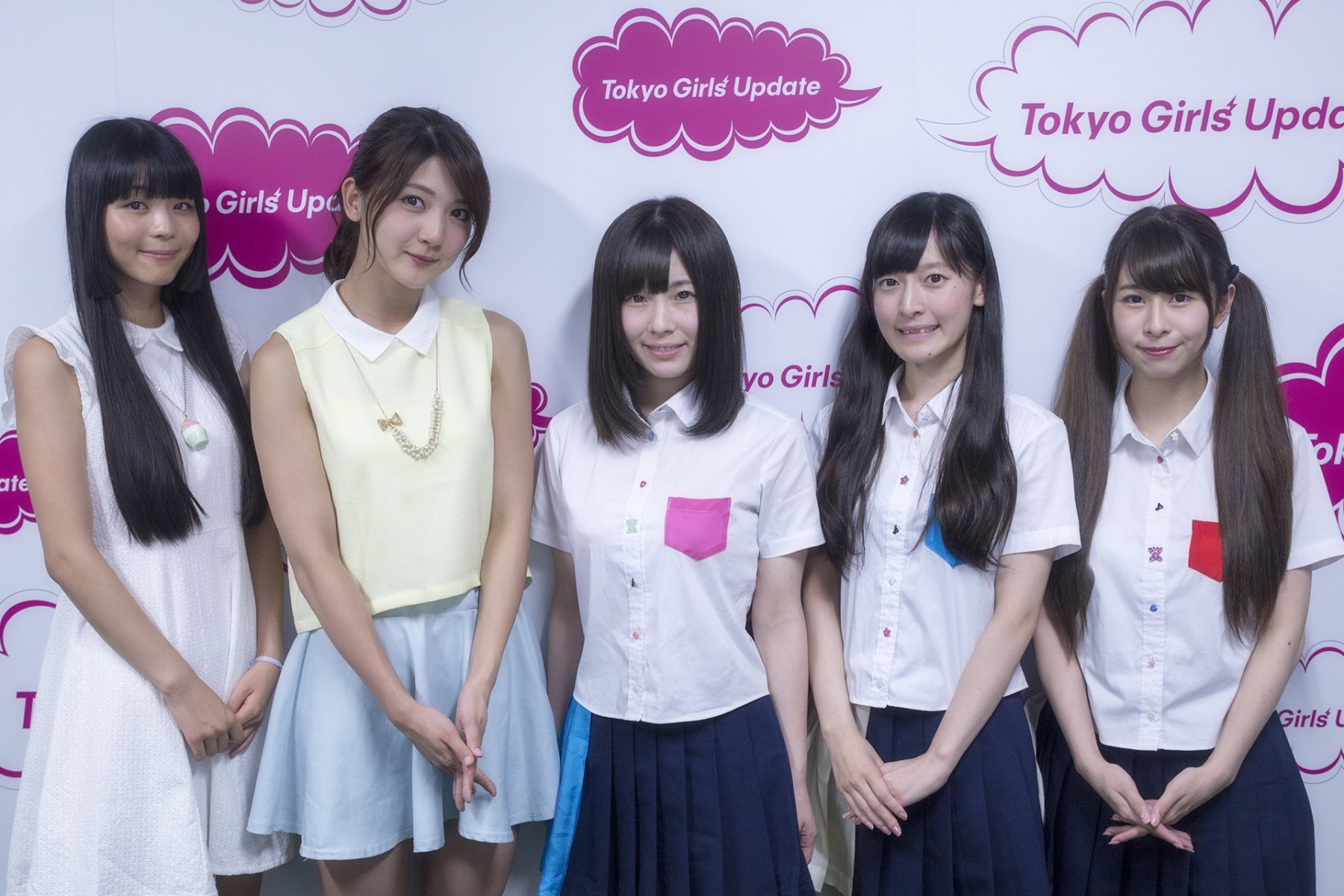
Sponsored Links
The idol industry is volatile and unpredictable. Currently, the need for idols to put their charm points out there by themselves is growing. We invited a management consultant lecturer for this project, challenging idols to learn about management and marketing theory! Here’s what the first lecture was like:http://tokyogirlsupdate.com/idol-marketing-lecture-vol1-20150854482.html
変化の激しく不透明なアイドル業界。今、アイドル自身が自分の魅力を発信していく必要性が高まってきています。この企画では、外資系戦略コンサルタントの講師を招き、アイドル本人たちが経営理論やマーケティング手法を学んで身に着けることに挑戦します! 第一講の様子はこちらからご覧になれます。
The teacher of this lecture 当講座の講師
CuteStrategy (Twitter https://twitter.com/CuteStrategy)
How should idols go about self-marketing?
セルフ・プロデュースはどう行うべきか?
Last time, I introduced the circumstances of modern idols, the necessity of idol self-marketing, and the basics of business and marketing idols should know. This time, I’d like to show go over the necessary future ideal image and challenge set-up for self-marketing with the idols.
前回は、現代アイドルの置かれている状況、アイドルのセルフ・プロデュースの重要性、アイドルも知っておくべきビジネスやマーケティングの基礎について紹介しました。今回は、セルフ・プロデュースを行う上で欠くことのできない将来の理想像と課題の設定をアイドルの皆さんと一緒に行います。
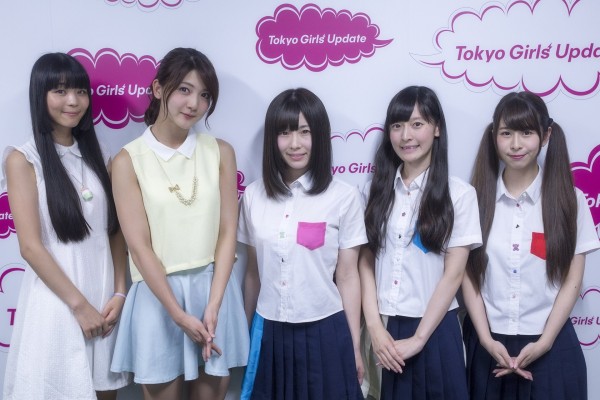
From left to right : Yufu Terashima, Saki Mori(UPUPGIRLS (KARI)), Nonoka Ishikawa(PIP), Miyu Sorai(PIP), Maika Hamano(PIP)
To begin with, self-marketing does not merely mean creating your own character. Here I’m referring to self-marketing in terms of coming up with an efficient approach to maximizing your individual charm, using it as a centripetal force to attract many people, and moving closer towards your own vision (your ideal image of the future).
そもそもセルフ・プロデュースとは、単なるキャラづくりのことを指しているわけではありません。ここでのセルフ・プロデュースとは、自分の魅力を最大限に引き出し、それを求心力として利用し多くの人を魅了し、自分のビジョン(将来の理想像)に向かって効率よくアプローチする方法を考えることを指します。
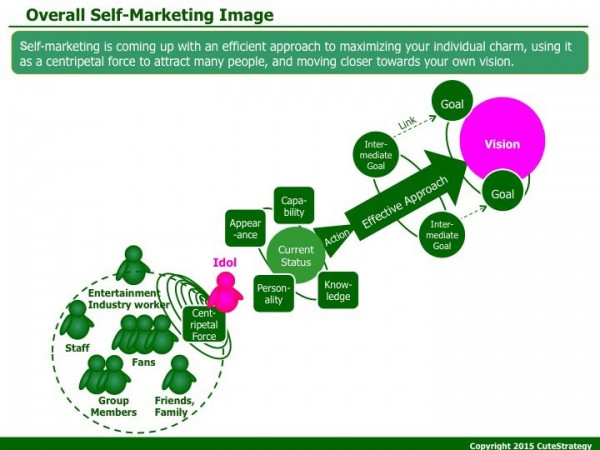
Therefore, it is first necessary to establish your vision for self-marketing. By establishing the ideal image of your vision, you will clearly be able to see the direction in which you need to go.
そこで、セルフ・プロデュースを行うためにはまずビジョンの設定が必要となります。自分の理想像となるビジョンを設定することによって、自分の進むべき方向を明確に示す必要性があるからです。
First, create a clear ideal vision of yourself
まずは自分の理想像をはっきりさせよう
So from here, let’s look the following points according to each of your visions and the construction of those visions.
さてここで、生徒(アイドル)のみなさんが掲げるビジョンとビジョンを組み立てる上でのポイントを見ていきましょう。
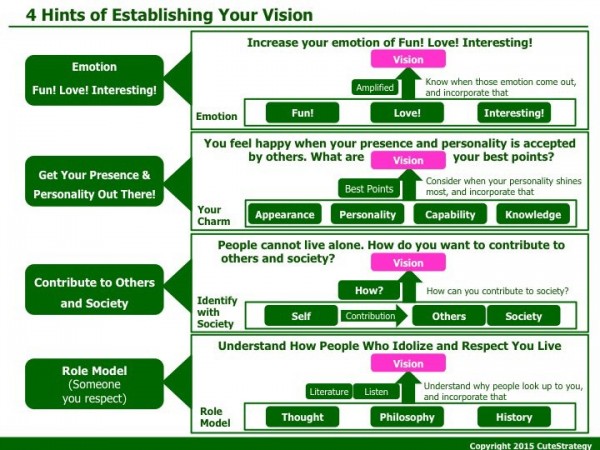
Ms.Mori (UPUPGIRLS (KARI)): “I want to be a go-between for Japan and France! I want French people to get to know the greatness of Japanese culture and in turn I want to tell people in Japan about the greatness of French culture. I’d like to perform in an event like JAPAN EXPO or have my own informative program where I talk about culture.”
森さん(アップアップガールズ(仮)):「日本とフランスの架け橋になりたいです!フランスの方々に日本文化の良さを身近に感じてほしいし、その逆も一緒で日本の方々にもフランス文化の良さを伝えたいと思っています。JAPAN EXPOのようなイベントに出演したり文化を発信するような情報番組を持てたりできたらなあって考えています。」

Saki Mori (UPUPGIRLS (KARI))
In order to establish a vision, one necessary point is prioritizing the “basic ‘Fun!’, ‘Love!’, or ‘Interesting!’ feelings” you have. In Ms.Mori’s case, she saw the honeymoon pictures of her parents and fell in love with the Palace of Versailles at first glance, which sparked her love of France. From a young age it seems she enjoyed reading informational magazines about France at the library. By reflecting this feeling of “Love!” in her vision, we can determine Mori’s own unique vision.
ビジョンを設定するうえで、自分自身の持っている「楽しい!好き!面白い!という根本的な感情」を大切にすることは一つの重要なポイントです。森さんの場合、ご両親の新婚旅行の写真を見て、ベルサイユ宮殿に一目ぼれしたことがきっかけでフランスが大好きに。幼いころから図書館でフランスの情報誌を読んで楽しんでいたそうです。こういった「好き!」の気持ちをビジョンに反映させることで、森さんならではのビジョンを決めることができています。
Ms.Terashima: “I want to be able to make the best use of the good points about yurukyara (local mascots) and the good points about idols. I don’t think it’s ideal to treat yurukyara as just back dancers for idols, and have idols appear for a short time at yurukyara events… I want to present those kinds of events in a new way where both fans of yurukyara and my own fans can feel satisfied.”
寺嶋さん「ゆるキャラの良さとアイドルの良さを活かした活動ができるようになりたいです。アイドルの引き立て役にゆるキャラが使われたり、キャラクターイベントに少しアイドルが出たりするのは私のなかであまり理想的ではなくて…ゆるキャラファンも自分のファンも満足できるような、そんなイベントなり新しい見せ方をしたいって思っています。」

Yufu Terashima
Ms.Terashima: “I want to be able to make the best use of the good points about yurukyara (local mascots) and the good points about idols. I don’t think it’s ideal to treat yurukyara as just back dancers for idols, and have idols appear for a short time at yurukyara events… I want to present those kinds of events in a new way where both fans of yurukyara and my own fans can feel satisfied.”
寺嶋さんも、森さんと同じく「好き!」という感情が強くビジョンに表れています。寺嶋さんの場合はそれに加えて、ビジョンを考えるうえで大事な二つ目のポイントである「他人にはない自分だけの個性・能力を世の中に広めたい気持ち」を盛り込むことが出来ています。
Ms.Terashima: “If you take it that the fan base of yurukyara are children and housewives, it would be a slightly different atmosphere from the people that usually visit my concerts. Also yurukyara meet and greet events are usually free it would be difficult to get fans to come to a ticketed event, and because yurukyara also in charge of their city’s PR so it would be difficult to plan. There would be a lot of obstacles, but since yurukyara have their own individual personalities, I think it would definitely be a ton of fun if they collaborated with idols!”
寺嶋さん「ゆるキャラのファン層って小さな子どもや主婦の方々だったりするので、普段私のライブに来てくれる方々とは少し雰囲気が違うんですよね。それにゆるキャラって普段無料で触れ合えるからファンの方をチケット制のイベントに呼び込むのって大変だし、みんなそれぞれの市のPRを担っているので企画も難しいんです。いろいろ問題点はあるんですけど、ゆるキャラってそれぞれが人格みたいなものを持っていて、アイドルとコラボレーションしたら絶対に楽しいと思うんです!」
Not just loving yurukyara, she truly understands that yurukyara and idols face some of the same problems (their numbers are steadily increasing, the frenzy for them has died down, etc.), realizing the impending sense of danger there. The way Terashima can calmly and objectively look at the relationship between yurukyara and idols shows the special ability that is part of her personality. By adding her own personality, her vision becomes even more unique.
ただゆるキャラが好きなだけではなく、ゆるキャラとアイドルの抱える類似の問題点(数がどんどん増えていく、熱が冷めていっているなど)を的確に把握し、そこに危機感を覚えています。こういったゆるキャラとアイドルの関係性を冷静に客観視できるところは寺嶋さんの個性であり、独自の能力です。そういった個性を加えることでビジョンがより独特のものになりますね。
Ms.Ishikawa (PIP): “I want to be an actress that stars in social awareness productions. I want to raise awareness of current social problems through movies and other works.”
PIP石川さん「社会派の作品に出演する女優さんになりたいです。現代にある社会問題を映画などの作品を通して問題提起したいです。」
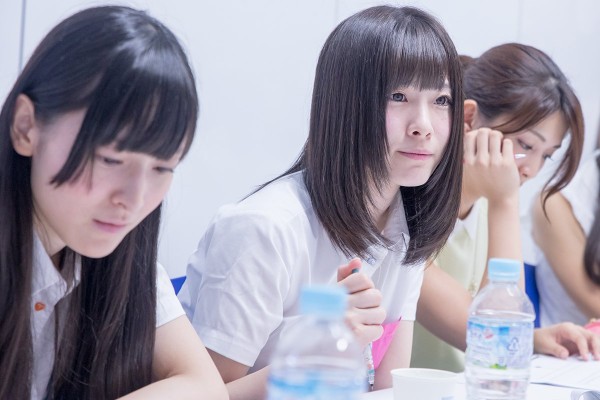
Miyu Ishikawa (PIP)
I believe Ms.Ishikawa’s vision stems from her third point of wanting to “contribute to others and to society”. I have to wonder if this strong feeling of wanting to contribute to someone comes from her strong sense of responsibility as a group leader.
石川さんのビジョンは、三つ目のポイントである「他人や社会への貢献」がしたいという思いが元になっています。誰かに対してこういった貢献をしたい!という思いが強いのは、グループのリーダーである石川さんならではの責任感の強さからきているのではないでしょうか。
Ms.Hamano (PIP): “From my 20s onward, I want to be the kind of artist that all generations say is cool. Like Vivienne Westwood, I want to connect music and fashion through work as a fashion designer and model, creating my own world through music and fashion, and not only be active artist in Japan, but worldwide.”
濱野さん(PIP)「20代から寿命まで、老若男女からかっこいい、かわいいと言ってもらえるアーティストになりたいです。ヴィヴィアン・ウエストウッドさんのように、音楽とファッションをつなぐようなファッションデザイナーやモデルの仕事を通して、音楽やファッションにおいて自分の世界観を創りだし、日本だけではなく世界で活躍するアーティストになりたいです。」
Ms.Sorai (PIP): “By collaborating (as an idol) with Chiba Lotte(Japanese professional baseball team), I want to mutually raise our name recognition and popularity! By appearing on sports programs and in informational magazines, I think it would be great if my fans paid attention to my favorite team, Chiba Lotte, and for Chiba Lotte’s fans to become fans of me as well.
空井さん(PIP)「千葉ロッテと自分(アイドル)のコラボによって相乗効果で知名度・人気度をあげたいなと思っています!スポーツ番組や情報誌でのインタビューなどを行うことによって、自分のファンにも私の大好きな千葉ロッテに注目してほしいし、千葉ロッテのファンの方が自分のファンになってくれたら最高だと思うんです。」
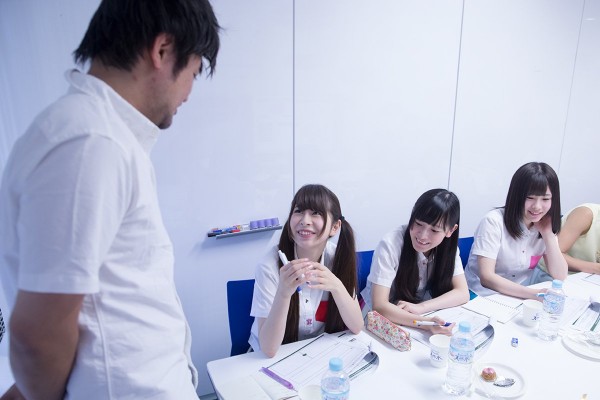
PIP’s producer Satoshi Hamano and three members; Maika Hamano (left), Miyu Sorai (center), and Nonoka Ishikawa (right)
Ms.Hamano and Ms.Sorai were also able to incorporate things that they like or enjoy into their vision. I especially think Hamano touches on a fourth point, which is that of a “role model”. A desire to create her own world comes from feeling that she wants to be the person like her role model, and that desire makes her vision stronger.
濱野さんも空井さんも、自分の好きなもの楽しいと思えるものをビジョンに盛り込んでいます。特に濱野さんはそれに加えて、四つ目のポイントである「ロール・モデル」について触れています。自分のあこがれの人、尊敬する人のように自分自身の世界観を創りたい!という思いが力強いビジョンに繋がっています。
Establishing a specific goal
具体的な目標を設定しよう
Now that their vision has taken shape, the next step is to set a goal. Here, a goal means an arrival point with a specific number or time limit in which they have to advance towards their vision. In order for each of them to realize their ideal image, we had them establish what they needed to do in detail in order to achieve it and their final target.
ビジョンが固まってきたところで、次のステップとして目標を設定しましょう。ここでの目標とは、ビジョンに向かって進んだ先にたどり着く具体的な数値や期限を持った最終到着時点を意味します。それぞれの理想像になるためには具体的にどんなことを達成すべきなのか、クリアしたい最終目標の設定を行ってもらいました。
Ms.Mori: “By the time I’m 30, I want to team up with a major television station in France and appear on a program introducing Japan. I wouldn’t want to just appear on location, and would like to work with staff and be involved from the production and planning programs!”
森さん「30歳までに、フランスのメジャーなテレビ局とタッグを組んで、日本を紹介する番組に出たいです。でもただロケに呼ばれるだけというのは嫌で、スタッフさんと協力して制作や企画段階から関わってみたい!」
In order to become a go-between for Japan and France, we were able to create a specific goal for a producing and appearing on a program there. Since it’s not necessary just to narrow it down to one goal, we added being active not only one television, but in magazines and on the internet as another goal.
日本とフランスの架け橋になるために、現地での番組制作・出演という具体的な目標を立てることができました。目標はひとつに絞らなくてもいいので、テレビだけでなく雑誌やインターネットでの活躍を目標に加えるのも一つの手かもしれません。
Ms.Terashima: “I’d like to hold a concert in an environment where both yurukyara fans and idol fans can enjoy themselves within one year from now.”
寺嶋さん「一年後までにゆるキャラファンもアイドルファンも喜んでもらえるような環境でライブがしたいなあと思います。」
Ms.Terashima said she wanted to do it as quickly as possible, in under a year! By settling specifically on “an environment where both yurukyara fans and idol fans can enjoy themselves”, she seems much more likely to get closer to actualizing her dream.
一年後と言わずなるべく早く…!とおっしゃっていた寺嶋さん。「ゆるキャラファンとアイドルファンの双方が楽しいと感じることのできる環境」が具体的に定まると、夢の実現にぐっと近づくことが出来そうです。
Ms.Ishikawa: “In 10 years I not only want to perform as an actress, but I want to create a work that casts a light on social problems. I think it would be wonderful if became a work that played nationwide.”
石川さん「10年後には女優として演じるだけでなく、社会問題を投げかけるような作品を自分自身で創ってみたいです。全国で上演されるような作品になったら素敵だなって思います。」
Ms.Ishikawa is thinking of how she wants to raise awareness for social problems through film. Including the name of the award she’d like to receive or something to that effect would possibly make it even more concrete.
映画という手段を通じて、ビジョンにある社会問題の提起が達成したいと考えている石川さん。受賞したい賞の名前などを盛り込むともっと具体性が増すかもしれません。
See, when setting up a goal, another important part of self-marketing is establishing an intermediate goal. For example, when making a goal of holding a concert at Budokan with 10,000 people by 2020, by making an intermediate goal of holding an outdoor concert with 3,000 people by 2018, you can realistically measure whether or not you are likely to achieve your main goal.
さて、目標を設定するのと同時に中間目標を設定することもセルフ・プロデュースを行うにあたって大事なことです。例えば、2020年までに武道館で1万人のライブを目標としたとき、2018年までに野音で3000人のライブを中間目標としておくことで、目標が達成できそうかどうかを現実的にはかることが出来ます。
Ms.Hamano: “Within two years I want to be a fashion magazine model. It would be a great opening for finding fans who appreciate my fashion and understand my personality.”
濱野さん「2年以内にファッション誌のモデルになりたいです。自分のファッションの好みや個性を理解してくれる、そんなファンを開拓する入口になったらと思います。」
Ms.Sorai: “To begin with, before the end of 2016, I want to interview a player from Chiba Lotte. Because ultimately I want to do a collaboration project that doesn’t yet exist…”
空井さん「まずは2016年の年度末までに、千葉ロッテの選手にインタビューをしたいです。最終的には今までにないコラボ企画をやりたいので…」
Thus, by determining the stages leading up that goal by deciding on an intermediate goal to achieve it, we connect the steps of the process and the motivation to persevere in order to steadily achieve that goal.
このように、目標の前段階で達成しておきたい中間目標を決めることで、着実に目標を達成するためのプロセスを踏むことやモチベーション維持にもつながります。
Learn problem-solving methods
問題解決方法を学ぼう
At the end of the second lecture, we learned about problem-solving methods in order to achieve these goals. (The first problem here, referring to the gap between the goal and your current status.)
第二講の最後に、これらの目標を達成するための問題解決方法について学びました。(そもそもここでの問題とは、目標と現状の自分とのギャップのことを指しています。)
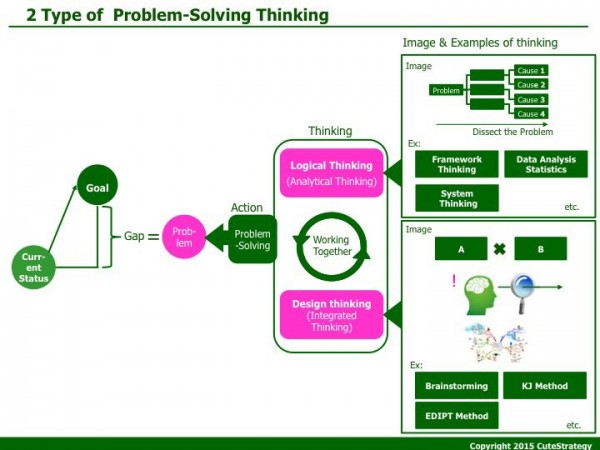
1. Logical problem-solving thought (Analytical thinking)
This is a way to organize the problem by dissecting it, isolating what went wrong, and using that to make improvements. Here we often use a technique in order to classify and divide things (MECE) in order to keep from making the same mistake. Like dividing fans by age into high school students, university students, and adults as one example. If most of your fans are adults, you can see how it might be difficult to get people to come if your concerts are during the evenings on weekdays.
1.論理的問題解決思考(分析的思考)
問題を細かく分析していくことによって整理し、何がいけなかったのかを突き止めて改善に役立てる方法です。漏れなくダブりなく物事を分類して分ける手法(MECE)などがここではよく使われます。例えば、ファンを年齢で区分けして高校生・大学生・社会人とします。もしファンのほとんどが社会人だとすると、平日の夕方からライブをしてもなかなか人を集めるのが難しいということがわかりますね。
2. Design thinking (Integrative thinking)
By putting different ideas out there, you can come up with innovative solutions that do not yet exist. Although it’s a method that has already been established, ideas such as putting handshake tickets in CDs, or actions that go against current common sense, in that sense can become problem-solving strategies that are close to design thinking methods.
2.デザイン思考(統合的思考)
アイデアを掛け合わせたりすることで、今までにないイノベーティブな解決策を導き出す方法です。今となっては定着している手法ですが、CDに握手券をつけるといった発想も今までの常識を覆すような行為であり、そういった意味ではデザイン思考法に近い問題解決策かもしれません。
On that note, the next installment in this series will be the last. In the third lecture, we’ll talk about effective approaches towards reaching your visions and goals, and in order to do that, have these students (idols) consider their own personal charm points. In addition, we’ll tell you what kind of changes the idols that took this course experienced in regards to their sense of awareness!
さて、このシリーズも次回が最後になります。第三講では、ビジョンや目標に到達するための効率的なアプローチ方法、そのために必要な生徒(アイドル)たちの自分自身の魅力について考えます。また、講義を受けて生徒(アイドル)たちの意識がどう変わったのかについてお伝えします!
*The last installment will be published on August 22nd
最終講は8/22公開予定
Related links
Yufu Terashima official site : https://yufuterashima.com/
UPUPGIRLS (KARI) official site : http://www.upupgirlskakkokari.com/
PIP official site : http://platonics.jp/
The teacher of this lecture CuteStrategy
Twitter: https://twitter.com/CuteStrategy
Photo by Yasuhiro Okada
Translated by Jamie Koide
Sponsored Links

[Exclusive Program] Tokyo GIrls’ Update TV #006 : SBY in Shibuya109 & Pikarin’s Cosplay

Seiyuu Revolution! Multi-Skilled Talents Redefine the Job of Voice Actor!



